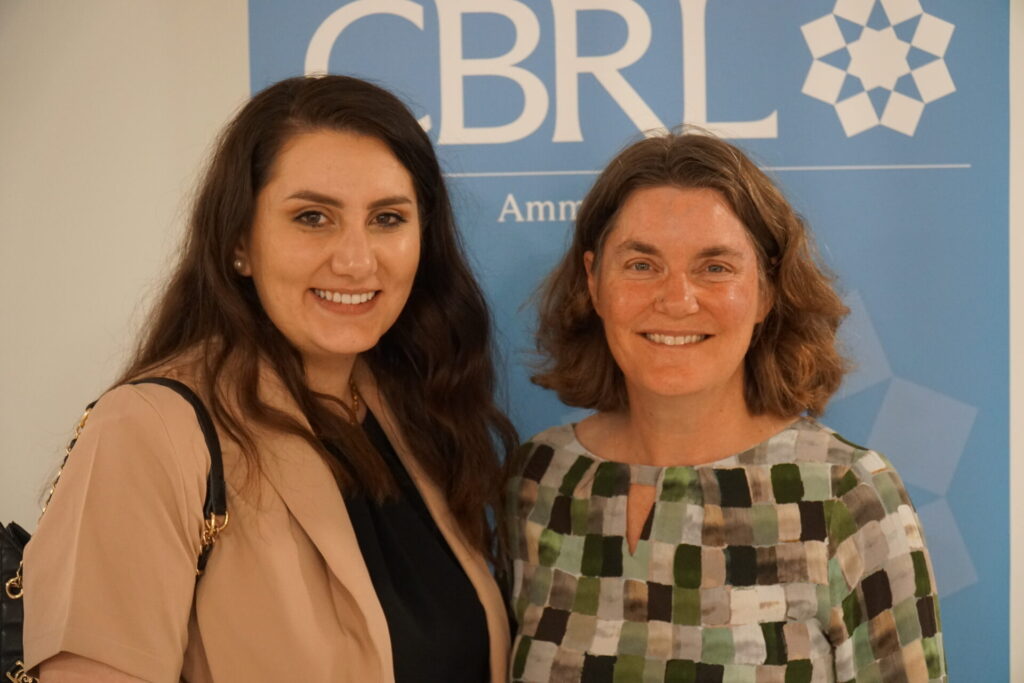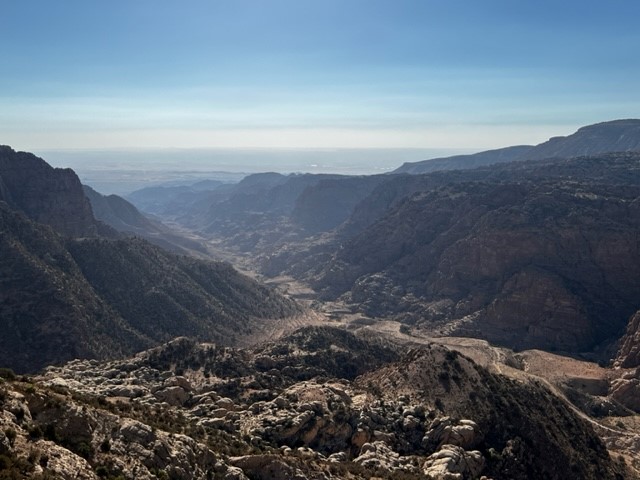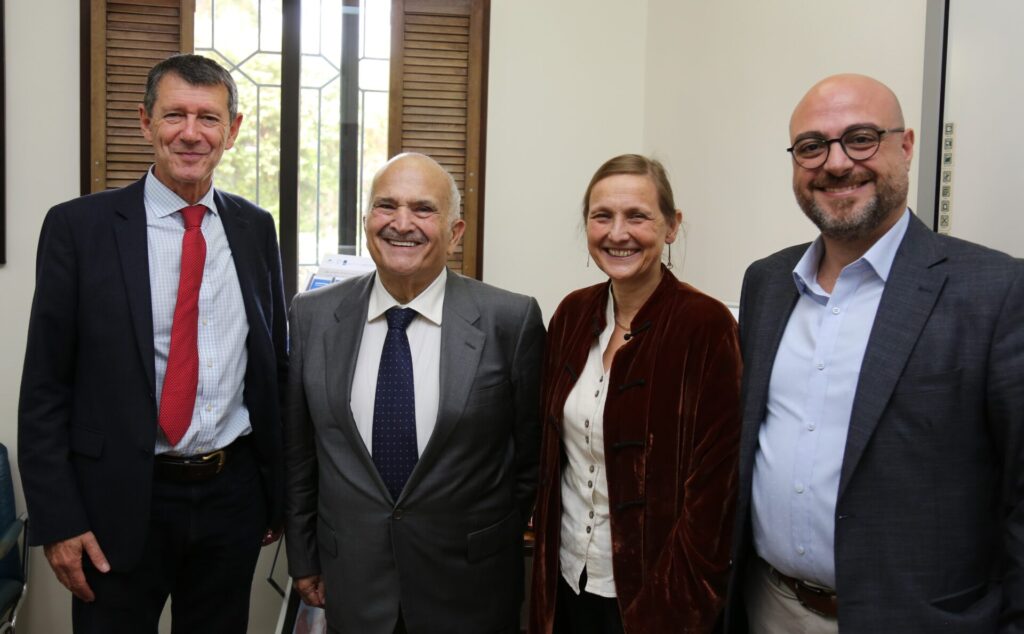As another year ends, the Board of Trustees, Directors and staff at CBRL would like to take the opportunity to thank you all for your support during 2022. With travel restrictions lifted, it has been wonderful to begin to host visitors and researchers at the institutes in Jerusalem and Amman.
The year has seen many achievements across our locations, from identifying and moving to new premises for the Amman Institute, the London team moving to new office space at the British Academy to the Kenyon Institute reopening after refurbishment. It has been a pleasure to host more in-person and hybrid events and meet and receive visitors in person, allowing us to reach more of our community and reconnect again after the pandemic.
Since reopening in Amman, we have hosted book launches by Philip Proudfoot, former Assistant Director in Amman, now at the Institute of Development Studies (IDS) at Sussex University, and Ebtihal Mahadeen, from the University of Edinburgh, former CBRL Fellow. Other talks were given by: Hala Ghanem and Clare Rishbeth from Sheffield and The Hashemite Universities; Sarah Irving, Staffordshire University and Contemporary Levant Editor-in-Chief; and Ann-Christin Zuntz, British Academy Postdoctoral Fellow at the University of Edinburgh. Details of all CBRL events are available on the website.
To date, we have awarded approximately £40k in grants in 2022, with the Networking Partnership Award scheme continuing to be open until the end of January 2023. With the return of researchers to the field, we are pleased to have reinstituted our regular research blogs on the website. For CBRL-sponsored research conducted in Jordan in 2022, I particularly recommend Hala Ghanem’s blog on the role Public Open Spaces play in the lives of local people and refugees in Amman. This piece is also a thought-provoking exploration of research as intervention.

We have made significant progress with our digital archives projects. Special thanks go to our Strategic Projects Director, Jessica Holland and Freja Howat, Project Archivist, who have worked closely in delivering this work. CBRL’s archive initiatives run alongside the British International Research Institutes (BIRI) Digital Coordination and Strategy Project to connect and manage to agreed professional standards all BIRI archives. The British Institute at Ankara (BIAA) is the project lead, and CBRL is pleased to have Konstantina Georgiadou join our London team while working on this collective project. The work will allow more of our archives to be accessible by more students and researchers across the globe.
We are reviewing our library holdings, following the CBRL library review in 2020, providing more study spaces for researchers at both institutes, greater electronic access (subject to funding) and conducting a rare books project to protect and ensure the future of these valuable assets. CBRL monographs are moving to open access and are accessible through the JSTOR platform. Some excellent volumes are already available, with more to follow. Caroline Middleton is both Editor-in-Chief of Levant and CBRL Monographs Editor. Please do contact her if you have ideas for new monographs.
Our staff continue to present the findings of their research at various venues. We were delighted that staff from the Amman Institute presented their research at the 15th International Conference on the History and Archaeology of Jordan (ICHAJ 15), organised by the Department of Antiquities and Yarmouk University (Irbid), under the patronage of HRH Prince El Hassan bin Talal in August this year. Over three days, it was a full programme, and colleagues from the British Institute at Ankara joined us. We were exploring other ways that our two organisations might also collaborate. Most recently, in December, Shatha Mubaideen from the Amman team was able to present her research on Mandate Heritage in Jordan at Durham University and on differing international approaches to conservation at Petra at the Theoretical Archaeology Group (TAG) conference in Edinburgh.
The long association between CBRL and the Department of Antiquities of Jordan continues with the signing of a new Memorandum of Understanding (MoU) in September. The most significant features of this MoU include the exchange of information, data, and documents, the implementation of agreed projects and activities, and technical support for capacity-building, including training courses and activities.
Our new collaboration with the Jordan Engineers Association, specifically the Architecture Division of Urban and Architectural Heritage Preservation Committee, continued to grow and thrive with lectures, a training course, site visits and a one-day conference, expanding to include the participation of representatives from the occupied Palestinian territories. Architects play a prominent role in shaping the buildings and spaces we inhabit and protecting and safeguarding heritage as part of shared lived identities. In Jordan, built heritage dating after 1750 is not well protected as archaeological heritage dating before that date. It is very beneficial to share experiences with Palestinian colleagues, where there is a greater depth of experience dealing with historic buildings and community engagement and adaptive reuse. For a full update, see here.
In November, in Amman, we welcomed CBRL Chair Robert Bewley for the most recent season of the long-running (since 1997) Aerial Archaeology in Jordan (AAJ) Project, which he directs. This year Firas Bqa’in from the Amman Institute became AAJ co-director in recognition of his ongoing contribution and growing expertise. We always enjoy facilitating this project and seeing the spectacular photography produced and discoveries made. Unfortunately, this also reveals increasing looting, bulldozer and new construction damage to cultural heritage sites.

A personal highlight was the Dana +20 workshop co-organised with the School of Geography and the Environment, University of Oxford, held in September under the patronage of HRH Princess Basma Bint Talal of Jordan. Twenty years ago, concerned academics and practitioners gathered at the Dana Reserve to produce the Dana Declaration on Conservation and Mobile Peoples. The initiative is important to me because between 1998 and 2002, I got to know the Reserve intimately through the Wadi Faynan Project and my CBRL Postdoctoral Fellowship held at the University of Leicester, an association I continued in my role as director of the Amman Institute. Today, the Dana+20 provides the opportunity to work with diverse colleagues, including Dawn Chatty, Emerita Professor of Anthropology and Forced Migration at Oxford, Ariell Ahearn, also at Oxford, Olivia Mason, at Newcastle University, as a researcher with the opportunity to make an important contribution to the future of mobile peoples and endangered cultural landscapes.
I extend particular thanks to HRH Prince El Hassan bin Talal, HE Prof. Fadi Bala’awi and staff of the Department of Antiquities, as well as the Ministry of Culture and Royal Scientific Society for facilitating and collaborating on CBRL’s work in Jordan in 2022.
Looking to 2023, we hope that you will continue to follow our work in all locations, whether by subscribing to our mailing list, attending our events, becoming a member of CBRL, or partnering with us on one of our initiatives.

Carol Palmer, 20 December 2022














